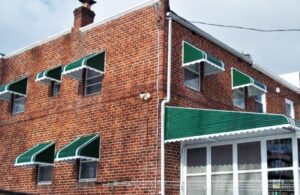
Some property owners remove their window awnings once winter arrives, but you can receive year-round benefits when you keep your window awnings and patio covers up. However, you must work with your designer at Carroll Architectural Shade to design awnings that withstand winter and its various weather conditions. If you prefer to store your awnings, Carroll Architectural Shade also offers a winter storage service for our clients. How can you design awnings made to withstand winter? Consider the following critical considerations.
Choose High-Pitched or High Snow Load-Rated Awnings
Awnings designed to stay in place during winter need to shed snow easily or handle heavy snow and ice accumulation without collapsing under their weight. Depending on the density, one cubic foot of snow can weigh between seven and 20 pounds!
You can help ensure your awnings withstand winter by choosing high-pitched awnings. These awnings shed snow more quickly and efficiently than flat awnings or those with lower pitches. If you install a flat awning or one with a low pitch, choose an awning with a high snow-load capacity rating. Awnings with those high ratings are built with strong frames to support the weight of heavy snow accumulation.
Choose Metal Awnings
Awnings made from corrosion-resistant materials, including aluminum or galvanized steel, are ideal for winter use. Metal awnings are stronger than fabric awnings, so they can support the weight of more pounds of snow and ice without risking damage. Metal awnings are also less likely to be damaged by strong winds that come with a winter storm.
High-quality metal awnings may cost more initially than fabric awnings, but they can maintain their integrity for up to 50 years or longer before replacing them.
Select the Ideal Awning Fabric
If you design fabric awnings, ensure you and your design team select the best fabric to support your awning during the winter months. Canvas awnings are not best for use in areas of the country with the heaviest snowfall. Canvas is a cotton material that is not naturally waterproof, so these awnings must be covered with a water-resistant coating. However, you may need to reapply the coating over time.
Acrylic fabric is a better choice for awnings that must withstand winter weather. Acrylic is naturally water-resistant, so you do not need to apply a waterproof coating that may wear off. You might also consider polytetrafluoroethylene (PTFE) fabric that is strong, waterproof, and abrasion-resistant. This fabric enables snow and ice to slide off easily and prevent accumulation.
Consider Retractable Awnings
Retractable awnings do not have to be removed during winter to stay in excellent condition. You may extend these awnings when the weather is mild, then retract them when snowfall or strong winds are expected.
If you want to use your awnings throughout the year, consult with your Carroll Architectural Shade designers to create an awning built to withstand winter conditions.
CONTACT CARROLL ARCHITECTURAL SHADE TODAY
Through our combined locations in Baltimore, Maryland, and Washington, D.C., Carroll Architectural Shade provides innovative craftsmanship, superb service, competitive pricing, and unfailing attention to detail for customers throughout Maryland and Virginia.
Our highly skilled craftsmen design and custom manufacture shade products in-house, including commercial awnings, residential awnings, retractable awnings, roll-up curtains, aluminum awnings, and flat metal canopies. Founded in 1958 by James Carroll Sr., and still family-owned by his sons today, Carroll Architectural Shade remains committed to delivering top-quality craftsmanship and service.
Visit our website to see how we can serve you and follow us on Facebook, Twitter, LinkedIn, and Pinterest.
